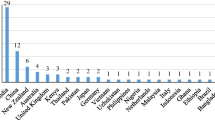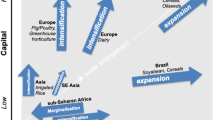Abstract
This article reports the results of a survey with Canadian farmers (n = 166) to analyze the mechanisms that shape their intention to adopt farming practices that can mitigate climate change. Specifically, we are interested in assessing the farmers’ fertilizer purchase behavior in the face of climate change challenges. We thus proposed and tested a structural equation model in which the purchase intention of agricultural technologies by a farmer is positively influenced by their climate change perceptions (hypothesis H1) and appetite for innovation (H2) (χ2/Df = 1.145; p-value = 0.282; PRATIO = 0.667; RMSEA = 0.030; RMR = 0.055; SRMR = 0.043; GFI = 0.966). Cluster analysis identified two clusters of farmers based on modeling of the survey responses where “cluster 1” presented a robust indication of innovation appetite and heightened climate change awareness, leading to stronger purchase intention of eco-friendly agricultural technologies, compared to “cluster 2.” It was concluded, with basis on the behavioral determinants of each cluster, that farmers interested in preserving and enhancing the quality of the environment are more likely to embrace strategies to improve fertilizer performance. In addition to confirming these influences, our findings suggest that informational and educational efforts towards green agricultural technologies could vary according to the farmers’ profile. Since they differ in the degree of climate change awareness and innovativeness by demographic characteristics (such as region, age, and farm size), the effectiveness of educational campaigns is expected to be diverse as well.

Similar content being viewed by others
References
Abreu MCS, Freitas ARP, Rebouças SMDP (2017) Conceptual model for corporate climate change strategy development: empirical evidence from the energy sector. J Cleaner Prod 165:382–392. https://doi.org/10.1016/j.jclepro.2017.07.133
Ajzen I (1991) The theory of planned behavior. Organ Behav Hum Decis Process 5:179–211
Arbuckle JG, Morton LW, Hobbs J (2015) Understanding farmer perspectives on climate change adaptation and mitigation: the roles of trust in sources of climate information, climate change beliefs, and perceived risk. Environ Behav 47(2):205–234. https://doi.org/10.1177/0013916513503832
Arunrat N, Wang C, Pumijumnong N, Sereenonchai S, Cai W (2017) Farmers’ intention and decision to adapt to climate change: a case study in the Yom and Nan basins, Phichit province of Thailand. J Cleaner Prod 143:672–685. https://doi.org/10.1016/j.jclepro.2016.12.058
Barnes AP, Toma L (2012) A typology of dairy farmer perceptions towards climate change. Clim Change 112:507–522. https://doi.org/10.1007/s10584-011-0226-2
Borges JAR, Oude Lansink AGJM, Ribeiro CM, Lutke V (2014) Understanding farmers’ intention to adopt improved natural grassland using the theory of planned behavior. Livest Sci 169:163–174. https://doi.org/10.1016/j.livsci.2014.09.014
Calza F, Parmentola A, Tutore I (2017) Types of green innovations: ways of implementation in a non-green industry. Sustainability 9:1301. https://doi.org/10.3390/su9081301
Fertilizer Canada (2018) Annual report 2018: value add +. https://fertilizercanada-ksiu6qbsd.netdna-ssl.com/wp-content/uploads/2018/08/fc_annualreport2018_en_vf2-web.pdf. Accessed 10 July 2020
Dessart FJ, Barreiro-Hurlé J, Van Bavel R (2019) Behavioural factors affecting the adoption of sustainable farming practices: a policy-oriented review. Eur Rev Agric Econ 46:417–471. https://doi.org/10.1093/erae/jbz019
Drejeris R, Miceikienė A (2018) Multi-criteria measurement of sustainable innovativeness in farming organisations: evidence from Lithuania. Sustainability 10(9):3347. https://doi.org/10.3390/su10093347
Fertilizers Europe (2017) Nitrogen fertilization: inhibitors. https://www.fertilizerseurope.com/wp-content/uploads/2017/09/Nitrogen-Fertilization-Inhibitors.pdf. Accessed 20 July 2020
Far ST, Rezaei-Moghaddam K (2017) Determinants of Iranian agricultural consultants’ intentions toward precision agriculture: integrating innovativeness to the technology acceptance model. J Saudi Soc Agric Sci 16(3):280–286. https://doi.org/10.1016/j.jssas.2015.09.003
Foguesatto CR, Artuzo FD, Talamini E, Machado JAD (2020) Understanding the divergences between farmer’s perception and meteorological records regarding climate change: a review. Environ Dev Sustain 22(1):1–16. https://doi.org/10.1007/s10668-018-0193-0
Fornell C, Larcker DF (1981) Evaluating structural equation models with unobservable variables and measurement error. J Mark Res 18(1):39–50. https://doi.org/10.2307/3151312
Frank E, Eakin H, López-Carr D (2011) Social identity, perception and motivation in adaptation to climate risk in the coffee sector of Chiapas. Mexico Global Environ Change 21(1):66–76. https://doi.org/10.1016/j.gloenvcha.2010.11.001
Funk TF (1982) Fertilizer buying behavior of Ontario Farmers. Can J Agric Econ 30(3):319–332. https://doi.org/10.1111/j.1744-7976.1982.tb01988.x
Galliano D, Nadel S (2013) The determinants of eco-innovation adoption according to firm’s strategic profile: the case of French industry. Revue D’économie Industrielle 142(2):77–110
Goldsmith RE, Hofacker CF (1991) Measuring consumer innovativeness. J Acad Mark Sci 19(3):209–221
Gramig BM, Barnard JM, Prokopy LS (2013) Farmer beliefs about climate change and carbon sequestration incentives. Climate Res 56(2):157–167. https://doi.org/10.3354/cr01142
Hair JF Jr, Black WC, Babin BJ, Anderson RE (2009) Multivariate data analysis, 7th edn. Prentice Hall, NJ, USA
Haque F, Chiang YW, Santos RM (2019) Alkaline mineral soil amendment: a climate change ‘stabilization wedge’? Energies 12:2299. https://doi.org/10.3390/en12122299
Hasler K, Olfs H-W, Omta O, Bröring S (2016) Drivers for the adoption of eco-innovations in the German fertilizer supply chain. Sustainability 8(8):682. https://doi.org/10.3390/su8080682
Hasler K, Olfs H-W, Omta O, Bröring S (2017) Drivers for the adoption of different eco-innovation types in the fertilizer sector: a review. Sustainability 9(12):2216. https://doi.org/10.3390/su9122216
Hitayezu P, Wale E, Ortmann G (2017) Assessing farmers’ perceptions about climate change: a double-hurdle approach. Clim Risk Manage 17:123–138. https://doi.org/10.1016/j.crm.2017.07.001
Hooper D, Coughlan J, Mullen MR (2008) Structural equation modelling: guidelines for determining model fit. Electronic Journal of Business Research Methods 6(1):53–60
Jiang W, Huang Z, Peng Y, Fang Y, Cao Y (2020) Factors affecting prefabricated construction promotion in China: A structural equation modeling approach. PLoSONE 15(1):e0227787. https://doi.org/10.1371/journal.pone.0227787
Johnson DK, Lybecker KM (2012) Paying for Green: an economics literature review on the constraints to financing environmental innovation. Electronic Green Journal 1(33):1–10. https://doi.org/10.5070/G313312662
Keating BA, Herrero M, Carberry PS, Gardner J, Cole MB (2014) Food wedges: framing the global food demand and supply challenge towards 2050. Glob Food Sec 3:125–132. https://doi.org/10.1016/j.gfs.2014.08.004
Kemp R, Volpi M (2008) The diffusion of clean technologies: a review with suggestions for future diffusion analysis. J Cleaner Prod 16(1):S14–S21. https://doi.org/10.1016/j.jclepro.2007.10.019
Kool M (1994) Buying behavior of farmers. Wageningen University Press, The Netherlands
Lioutas ED, Charatsari C (2017) Green innovativeness in farm enterprises: what makes farmers think green? Sustain Dev 26(4):337–349. https://doi.org/10.1002/sd.1709
Maldonado-Guzmán G, Garza-Reyes JA (2020) Eco-innovation practices’ adoption in the automotive industry. International Journal of Innovation Science 12(1):80–98. https://doi.org/10.1108/IJIS-10-2019-0094
Mase AS, Gramig BM, Prokopy LS (2017) Climate change beliefs, risk perceptions, and adaptation behavior among Midwestern U.S. crop farmers. Clim Risk Manage 15:8–17. https://doi.org/10.1016/j.crm.2016.11.004
Milne W (2005) Changing climate, uncertain future: considering rural women in climate change policies and strategies. Canadian Woman Studies 24(4):49–54
Mitter H, Larcher M, Schönhart M, Stöttinger M, Schmid E (2019) Exploring farmers’ climate change perceptions and adaptation intentions: empirical evidence from Austria. Environ Manage 63:804–821. https://doi.org/10.1007/s00267-019-01158-7
Naor M, Bernardes ES, Druehl CT, Shiftan Y (2015) Overcoming barriers to adoption of environmentally-friendly innovations through design and strategy: learning from the failure of an electric vehicle infrastructure firm. Int J Oper Prod Manag 35(1):26–59. https://doi.org/10.1108/IJOPM-06-2012-0220
Niles MT, Mueller ND (2016) Farmer perceptions of climate change: associations with observed temperature and precipitation trends, irrigation, and climate beliefs. Global Environ Change 39:133–142. https://doi.org/10.1016/j.gloenvcha.2016.05.002
Niles MT, Brown M, Dynes R (2016) Farmer’s intended and actual adoption of climate change mitigation and adaptation strategies. Clim Change 135:277–295. https://doi.org/10.1007/s10584-015-1558-0
Niles MT, Esquivel J, Ahuja R, Mango N, Duncan M, et al. (2017) Climate change & food systems: assessing impacts and opportunities. Meridian Institute. Washington, DC, USA. https://scholarworks.uvm.edu/cgi/viewcontent.cgi?article=1016&context=calsfac. Accessed 10 July 2020.
Ribaudo M, Livingston M, Williamson J (2012) Nitrogen management on U.S. corn acres, 2001–10, Economic brief no. (EB-20). USDA-ERS, Washington, DC, USA
Roehrich G (2004) Consumer innovativeness. J Bus Res 57(6):671–677. https://doi.org/10.1016/s0148-2963(02)00311-9
Sehnem S, Lazzarotti F, Bencke F (2016) Sustainable practices and eco-innovations adopted by industrial companies. International Journal of Innovation 4(2):42–58. https://doi.org/10.5585/iji.v4i2.106
Shah MMI, Grant WJ, Stocklmayer S (2016) Farmer innovativeness and hybrid rice diffusion in Bangladesh. Technol Forecasting Social Change 108:54–62. https://doi.org/10.1016/j.techfore.2016.04.015
Shanmugam V, Marsh JE (2015) Application of structural equation modeling to the social sciences: a brief guide for researchers. Mesure Et Évaluation En Éducation 37(3):99–123. https://doi.org/10.7202/1036329ar
Shen J, Zhu Q, Jiao X, Ying H, Wang H et al (2020) Agriculture Green Development: a model for China and the world. Front Agric Sci Eng 7(1):5–13. https://doi.org/10.15302/J-FASE-2019300
Silva AG, Canavari M, Sidali KL (2017) A technology acceptance model of common bean growers’ intention to adopt integrated production in the Brazilian Central Region. Die Bodenkultur: Journal of Land Management, Food and Environment 68(3):131–143. https://doi.org/10.1515/boku-2017-0012
Sok J, Borges JR, Schmidt P, Ajzen I (2021) Farmer behaviour as reasoned action: a critical review of research with the Theory of Planned Behaviour. J Agric Econ 72(2):388–412. https://doi.org/10.1111/1477-9552.12408
Statistics Canada (2016) Table 32–10–0404–01: farms classified by total farm area. https://doi.org/10.25318/3210040401-eng. Accessed 19 July 2020
The Fertilizer Institute (2017) What are the 4Rs. https://nutrientstewardship.org/4rs/. Accessed 20 July 2020.
Valin H, Sands RD, van der Mensbrugghe D, Nelson GC, Ahammad H et al (2014) The future of food demand: understanding differences in global economic models. Agric Econ 45:51–67. https://doi.org/10.1111/agec.12089
Walder P, Sinabell F, Unterlass F, Niedermayr A, Fulgeanu D et al (2019) Exploring the relationship between farmers’ innovativeness and their values and aims. Sustainability 11(20):5571. https://doi.org/10.3390/su11205571
Weber C, McCann L (2015) Adoption of nitrogen-efficient technologies by U.S. corn farmers. J Environ Qual 44(2):391–401. https://doi.org/10.2134/jeq2014.02.0089
Acknowledgements
This study was supported by the Ontario Agri-Food Innovation Alliance through a Gryphon’s LAAIR Market Validation Grant (GLAAIR2018-5345).
Author information
Authors and Affiliations
Corresponding author
Additional information
Communicated by Beata Madari and accepted by Topical Collection Chief Editor Christopher Reyer.
Publisher's note
Springer Nature remains neutral with regard to jurisdictional claims in published maps and institutional affiliations.
This article is part of the Topical Collection on Regional management practices with positive effects on soil carbon to meet the goals of the 4p1000 initiative
Supplementary Information
Below is the link to the electronic supplementary material.
Rights and permissions
About this article
Cite this article
Araujo, F.S.M., Fantucci, H., de Oliveira Lima, S.H. et al. Modeling Canadian farmer’s intention to adopt eco-friendly agricultural inputs and practices. Reg Environ Change 22, 44 (2022). https://doi.org/10.1007/s10113-022-01901-7
Received:
Accepted:
Published:
DOI: https://doi.org/10.1007/s10113-022-01901-7




